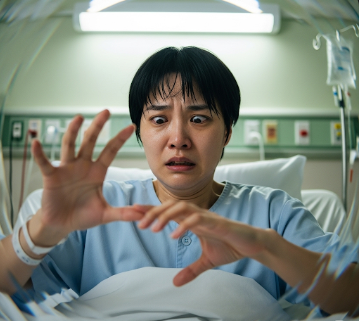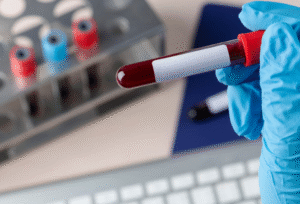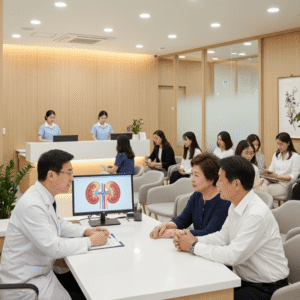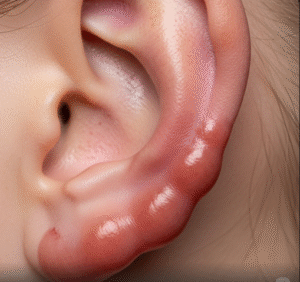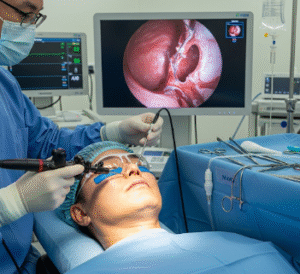Overview
Delirium is an acute, sudden-onset mental disorder characterized by confusion, disorientation, and changes in attention and awareness. It often develops over hours to days and is usually secondary to another medical condition, infection, medication, or metabolic imbalance. Delirium can affect older adults, hospitalized patients, and those with underlying cognitive impairments. In Korea, neurology, psychiatry, and geriatric clinics provide advanced evaluation, monitoring, and treatment for patients experiencing delirium.
Highlights:
➤ Acute mental disturbance – Sudden onset of confusion and altered awareness
➤ Temporary but serious – Symptoms fluctuate and can resolve with treatment of underlying causes
➤ High-risk populations – Elderly, hospitalized patients, and those with chronic illnesses
Key Facts
➤ Prevalence: Delirium affects 10–30% of hospitalized patients, particularly in intensive care units (ICUs).
➤ Age affected: Most common in older adults over 65 but can occur at any age.
➤ Gender: Both men and women are equally affected, though older males may have slightly higher prevalence in some studies.
➤ Impact: Untreated delirium can lead to long-term cognitive impairment, prolonged hospital stay, increased morbidity, and mortality.
What is Delirium?
Delirium is defined as a rapid onset disturbance of consciousness and cognition, often accompanied by fluctuating attention, memory deficits, and perceptual disturbances. Unlike dementia, delirium develops quickly and is potentially reversible if the underlying cause is identified and treated.
Highlights:
➤ Acute onset: Hours to days rather than months or years
➤ Fluctuating symptoms: Periods of lucidity alternating with confusion
➤ Cognitive impairment: Affects attention, memory, and perception
What Symptoms Are Related to Delirium?
➤ Confusion and disorientation – Inability to recognize time, place, or people
➤ Reduced attention and concentration – Difficulty following conversations or instructions
➤ Agitation or lethargy – Patients may be hyperactive or hypoactive
➤ Hallucinations or delusions – Seeing or hearing things that are not present
➤ Sleep disturbances – Day-night reversal or insomnia
➤ Emotional changes: Anxiety, fear, irritability, or apathy
➤ Rapid mood swings: Sudden emotional reactions without clear triggers
What Causes / Possible Causes
➤ Infections: Urinary tract infections, pneumonia, sepsis
➤ Metabolic disturbances: Electrolyte imbalance, hypoglycemia, dehydration
➤ Medications or substance use: Sedatives, anticholinergics, alcohol withdrawal, or drug interactions
➤ Neurological conditions: Stroke, head injury, or neurodegenerative diseases
➤ Surgery or hospitalization: Postoperative delirium is common, especially in elderly patients
➤ Organ failure: Liver or kidney dysfunction leading to toxin buildup
Highlights:
➣ Delirium is usually secondary to an underlying medical, surgical, or pharmacological cause
➣ Prompt identification and correction of causes are essential for recovery
When Should I See My Doctor?
➤ Sudden confusion or disorientation – Especially in older adults or hospitalized patients
➤ Agitation, hallucinations, or delusions – Acute changes in mental state
➤ Rapid deterioration in cognitive function – Unable to perform daily tasks
➤ Associated fever, infection, or metabolic changes – Possible underlying medical emergency
➤ Sleep disturbances or emotional changes – When new and unexplained
Highlights:
➣ Immediate evaluation in neurology, psychiatry, or geriatric clinics in Korea is crucial
➣ Early intervention can prevent complications such as long-term cognitive decline or hospitalization
Care and Treatment
➤ Identify and treat underlying causes: Infections, electrolyte imbalances, medication adjustments
➤ Supportive care: Hydration, nutrition, and maintaining a safe environment
➤ Reorientation strategies: Clocks, calendars, familiar objects, and caregiver presence
➤ Medication management: Only when necessary for severe agitation; low-dose antipsychotics may be used
➤ Monitoring: Continuous observation to prevent falls, injuries, or complications
➤ Psychological support: Reassurance and calming techniques to reduce anxiety
Highlights:
➣ Delirium management requires multidisciplinary care including doctors, nurses, and caregivers
➣ Early identification and treatment of the cause are key to recovery
Treatment Options in Korea
Medical Treatments:
➤ Neurology and geriatric clinics: Detailed assessment of cognitive status and identification of underlying causes
➤ Medication review and adjustment: Avoidance of deliriogenic drugs and optimization of therapy
➤ Management of comorbidities: Control of infections, metabolic disturbances, and organ dysfunction
Advanced Procedures:
➤ Hospital monitoring in ICUs or specialized wards: For severe or high-risk cases
➤ Cognitive rehabilitation programs: Supportive therapy to improve attention and orientation
➤ Multidisciplinary approach: Integrating neurology, psychiatry, nursing, and rehabilitation for optimal care
Rehabilitation & Follow-Up Care:
➤ Regular cognitive assessment to track recovery and detect early signs of recurrence
➤ Family and caregiver education for early recognition and prevention
➤ Integration of rehabilitation, psychological support, and environmental modifications to reduce risk
Highlights:
➣ Korean clinics provide comprehensive, multidisciplinary care for delirium management
➣ Timely and targeted interventions improve recovery, reduce hospital stay, and prevent complications

